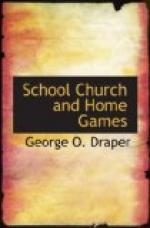Around the Chair
The teams are arranged as in previous games. The opponents at the head of the line are handed an orange. At the signal to “go” they must stand up, push their chair back from the table and run around the chair twice, return to the table, sit down and pass the orange to the next one in line, who repeats the performance of the first. The race ends when the last one in the line has circled the chair twice, sat down and held the orange above his head.
Jenkins Up
Divide the company into two sides. One division sits around the table on one side, the other on the opposite side. The members of the division “A” put their hands under the table and a small coin, dime or quarter, is passed from one to the other. When division “B” thinks they have had enough time, the captain calls out, “Jenkins up!” and the players of “A” hold up their closed hands; and when “Jenkins down!” is called, they must place their open hands, palm down, on the table. The players of “B” must guess under which palm the coin is. Every player may guess, but only the captain is to be obeyed when he orders an opponent to lift a hand. If a player can succeed in finding the whereabouts of the coin by causing an opponent to raise his hand, it is legitimate. The object is to have the hand containing the coin remain on the table last. Every hand left with the palm on the table when the hand hiding the coin is lifted, counts a point for the team holding the coin. The teams alternate the guessing.
Malaga Grapes
One who knows the game takes a spoon in his right hand, then taking it in his left hand, he passes it to the one sitting at his left, saying, “Malaga grapes are very fine grapes, the best to be had in the market”. He tells his neighbor to do the same. The spoon is thus passed from one to the other, each telling the same grape story. If anyone passes the spoon with the right hand, which is the natural thing to do, a forfeit can be claimed. The trick must not be told until it has gone around a table once or twice.
Table Football
An egg is blown and the shell used as the football. Two captains are selected, each choosing his side. Teams take places on the opposite sides of the table and endeavor to blow the egg shell over a goal line which is made two inches from and parallel to their opponents’ side of the table. After each goal the egg is placed in the centre of the table and the blowing begins with the sound of a whistle. No player can leave his place, and the “football” must be moved entirely by blowing. If the table be long, more than one egg may be used.
Spearing Peanuts
A number of peanuts are placed in the centre of the table. Each guest is armed with a hat pin. A few of the peanuts have black spots marked upon their end. These peanuts count 5 points. All other peanuts count 1 point. The player succeeding in scoring the highest number wins. The pin must be stuck into the shell. Showing the nut is not allowed.




